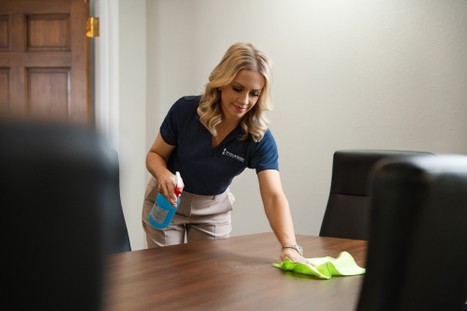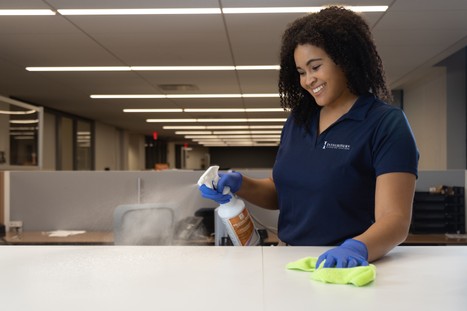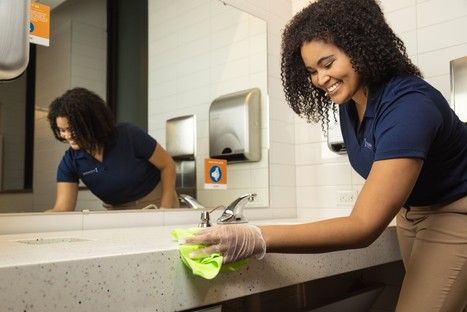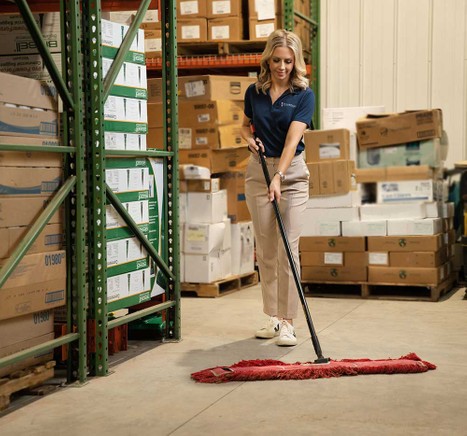Key Considerations When Hiring Commercial Cleaning Services in Ohio, Michigan, and Florida
Facility and operations managers across industries share similar goals when hiring janitorial partners: reliable service, clear scope, and measurable quality. But expectations aren’t identical everywhere. Regional labor markets, industry profiles, and regulatory requirements shape what managers look for in Ohio, Michigan, and Florida. IntegriServ’s experience across these markets shows that success comes from understanding both the universal fundamentals and the local nuances.
Pricing and Contract Models
Why it matters: Cleaning contracts are rarely just about cost. The way services are structured and priced often determines how predictable budgets are and how conflicts get avoided down the line.
Most agreements are based on square footage, labor hours, or flat monthly rates. Transparency in task lists and service frequencies is critical to prevent disputes.
Ohio: Practical, long-term contracts dominate, especially in universities, government facilities, and manufacturers that value predictable renewals and cost controls.
Michigan: Similar to Ohio but with stronger industrial influence. Auto plants and logistics hubs demand specialized protocols, leading to more detailed, higher-value bids.
Florida: Seasonal tourism and rising labor costs push for flexibility. Hospitality and healthcare facilities often require bundled services, scalable scopes, and rapid-response clauses.
No matter the region, managers evaluate how proposals account for property layout, operational schedules, and risk exposure. Larger sites may negotiate volume discounts, while hospitals and labs expect premiums tied to compliance and security.

Service Scope and Specialization
Why it matters: Cleaning services are only effective if expectations are precise. The most common disputes arise not from price but from unclear definitions of who does what, and when.
Facility managers expect a breakdown of daily, weekly, and monthly tasks—everything from restroom sanitizing and waste removal to periodic stripping and refinishing. Beyond that, specialization is often the deciding factor:
Healthcare requires strict infection-control protocols.
Schools schedule deep cleans during seasonal breaks.
Food-service facilities expect grease management.
Industrial plants involve hazardous materials, heavy equipment, and compliance-heavy cycles.
“Extras” such as disinfection programs, day porters, or event cleanup are increasingly requested. Managers also want evidence of quality control—whether that’s formal inspections, KPIs, or digital reporting tools. Vendors with the ability to scale services up or down without renegotiating show stronger adaptability.
Service Scope and Specialization
Why it matters: Cleaning services are only effective if expectations are precise. The most common disputes arise not from price but from unclear definitions of who does what, and when.
Facility managers expect a breakdown of daily, weekly, and monthly tasks—everything from restroom sanitizing and waste removal to periodic stripping and refinishing. Beyond that, specialization is often the deciding factor:
Healthcare requires strict infection-control protocols.
Schools schedule deep cleans during seasonal breaks.
Food-service facilities expect grease management.
Industrial plants involve hazardous materials, heavy equipment, and compliance-heavy cycles.
“Extras” such as disinfection programs, day porters, or event cleanup are increasingly requested. Managers also want evidence of quality control—whether that’s formal inspections, KPIs, or digital reporting tools. Vendors with the ability to scale services up or down without renegotiating show stronger adaptability.
Reputation, Experience, and References
Why it matters: A vendor’s track record often weighs as heavily as its price. Facilities can’t risk service interruptions or compliance gaps.
Decision-makers commonly request references, tour active sites, and review how long a vendor has been established. Industry certifications and memberships bolster credibility. In practice:
Hospitals gravitate toward contractors with prior healthcare experience.
Schools look for familiarity with public-sector expectations.
Positive word-of-mouth and responsiveness during bidding often predict long-term reliability.
Vendors who showcase stable client relationships and case studies from similar industries tend to be viewed as lower-risk choices.
Certifications, Training, and Compliance
Why it matters: Cleaning touches sensitive environments. Compliance isn’t optional—it’s essential for safety, liability, and public trust.
Green certifications are increasingly requested, especially in schools and hotels where stakeholders push for eco-friendly practices. Healthcare facilities expect HIPAA adherence and rigorous safety training. Public schools bring additional legal requirements:
Ohio/Michigan: State or FBI background checks are standard.
Florida: Fingerprint-based contractor screening is mandatory.
Facility managers evaluate not only whether training exists but also how it’s documented. Demonstrating that staff are both vetted and qualified often tips the scale in competitive bids.
Flexibility and Scheduling
Why it matters: Cleaning that disrupts daily operations creates as many problems as it solves. Timing and adaptability are critical to service quality.
Offices and schools: Cleaning typically occurs overnight or in early mornings.
Hospitality: Turnaround must be nearly immediate between events or guest checkouts.
Managers also want reassurance that staff shortages won’t derail operations. Strong vendors build in contingency plans—backup crews, 24/7 contact lines, and clear escalation paths. Some contracts even specify performance metrics for emergency response. Flexibility in storm cleanup, seasonal deep cleans, or last-minute requests consistently separates higher-performing contractors from the rest.
Sustainability and Green Cleaning
Why it matters: Environmental practices have moved from “nice-to-have” to “non-negotiable” in many sectors. Green cleaning is both a compliance factor and a branding consideration.
Ohio: Interest is steadily growing in schools and public buildings.
Michigan: “Green Schools” initiatives and watershed protections are driving eco-friendly adoption.
Florida: Tourism has accelerated demand; hotels and resorts expect eco-certification as baseline.
Buyers now look for microfiber tools, certified green products, and processes that minimize water and energy use. Vendors who align with broader corporate responsibility goals are more attractive to organizations balancing operational needs with sustainability targets.

Employee Screening and Insurance
Why it matters: Commercial cleaning means entrusting workers with secure spaces. Liability protection and workforce reliability are mandatory.
Managers expect proof of liability insurance and workers’ compensation before considering a vendor. Screening practices—background checks, drug testing, fingerprinting—are critical, especially in schools and healthcare environments. In higher-security facilities, requirements expand further.
Equally important is training in chemical safety, ladder protocols, and bloodborne pathogen handling. Well-trained, properly vetted employees minimize both safety risks and client liability.
Responsiveness and Customer Service
Why it matters: Even the best cleaning program fails if communication breaks down. Responsiveness is often the deciding factor once baseline capabilities are confirmed.
Facility managers watch closely during the bidding process: quick, thorough responses suggest what future service will look like. Top contractors establish clear feedback channels, use digital inspection tools, and schedule routine reviews. Some managers deliberately “test” responsiveness by posing urgent scenarios before awarding contracts.
In practice, clean spaces are expected; what builds long-term trust is a partner that adapts quickly and communicates clearly.
Regional Expectations at a Glance
| Factor | Ohio (Midwest) | Michigan | Florida |
|---|---|---|---|
| Key Industries | Manufacturing, healthcare, universities, schools, office/tech | Manufacturing, logistics, universities, healthcare | Tourism/hospitality, healthcare, service sector |
| Cost/Labor | Moderate costs; right-to-work; some union legacy | Similar wages; right-to-work since 2013; auto industry influence | Higher wages; service-heavy workforce; union presence |
| Regulations | State/FBI checks for schools; health inspections | Fingerprint checks for schools; moderate environmental regs | Strict fingerprint law for school contractors |
| Seasonal Factors | Harsh winters, salt damage, aging facilities | Winter impacts plus Great Lakes environmental concerns | Humidity, corrosion, hurricanes, high heat |
| Sustainability | Growing adoption in education/government | Green Schools and watershed programs | Strong eco demand, hospitality-driven |
| Typical Profile | Cost-conscious, punctual, practical | Industrial rigor, safety-focused | 24/7 readiness, hospitality-driven |
| Market Notes | Mix of family-owned and regional firms | Blend of national and regional, with union legacy | Highly competitive, association-led procurement |
The Bottom Line
Across Ohio, Michigan, and Florida, the fundamentals of hiring remain consistent: cost, scope, safety, and service quality. What varies is how those priorities are weighted. Florida’s market leans heavily toward flexibility and eco-friendly practices; Ohio and Michigan emphasize industrial specialization and cost predictability.
IntegriServ’s takeaway is that while pricing may initiate a conversation, it’s compliance, flexibility, and responsiveness that sustain a successful contract over the long term.
A Note on Industry Experience
One recurring theme in every region is the demand for sector-specific expertise. Healthcare facilities, schools, and manufacturers each bring compliance requirements and operational nuances that generic cleaning solutions don’t address. IntegriServ has found that tailoring cleaning programs to each industry not only reassures decision-makers but also ensures smoother day-to-day performance.


